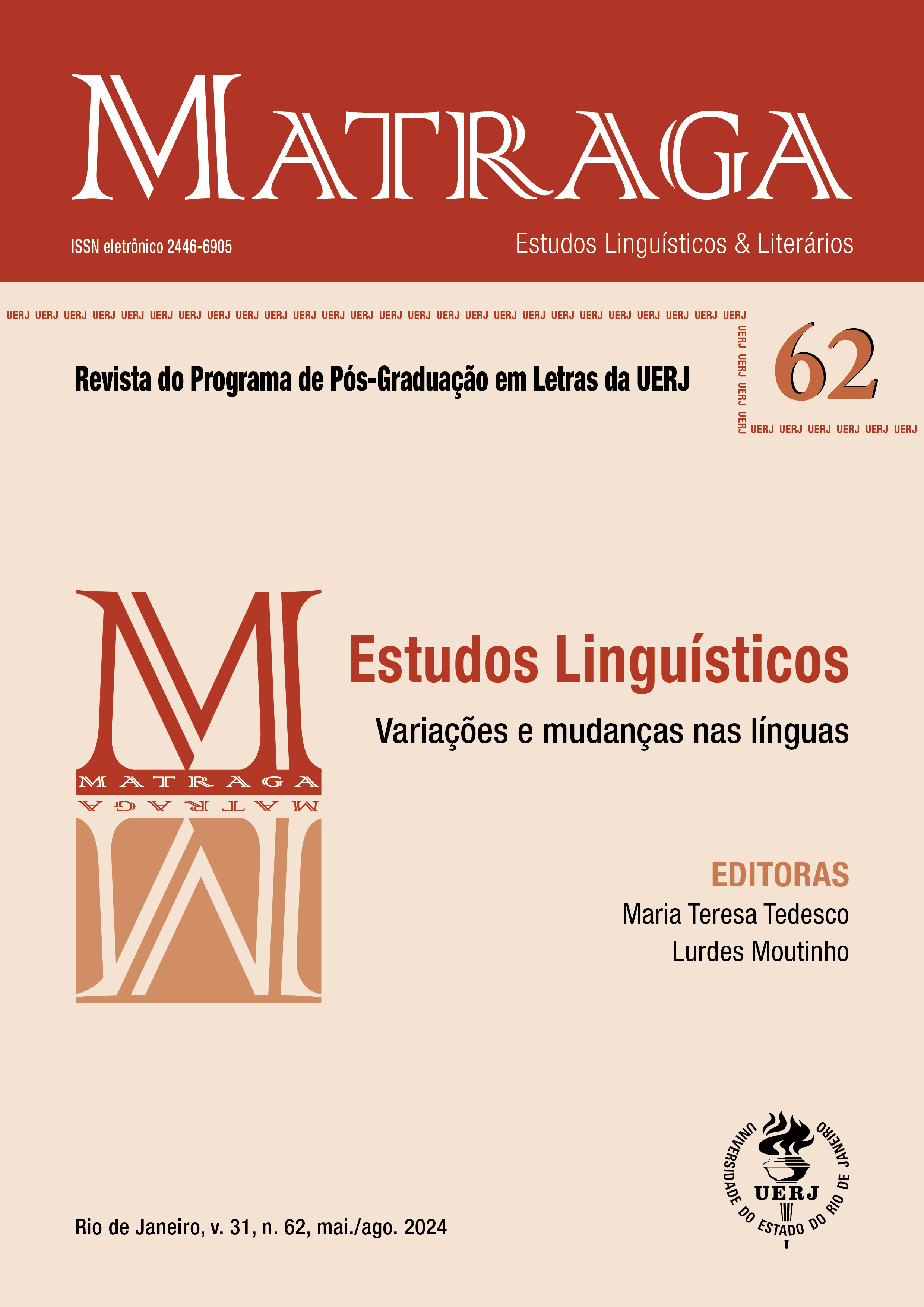Perception of sociolinguistic variation: the social evaluation of the alternation between the final unstressed nasal diphthong and oral vowel in the Carioca variety
DOI:
https://doi.org/10.12957/matraga.2024.79678Keywords:
Experimental Sociolinguistics, Perception, Social evaluation, Sound variation, Nasal diphthongAbstract
One of the issues in the study of linguistic variation and change concerns the social evaluation of variants. This article focuses on the dynamics of linguistic variation in the speech community of Rio de Janeiro, focusing on the evaluation of variants of the alternation between the final unstressed nasal diphthong and the oral vowel. The social evaluation of the variants was accessed through an experiment using the matched-guise technique. The experiment involved presenting participants with oral stimuli, that is vehicle sentences containing a lexical item with the variants of the variable. The task consisted in associating the stimulus heard with one of the two photos presented afterwards, characterizing the speaker of the sentence based on socioeconomic status. No participant heard the same lexical item with both variants. Furthermore, speaker’s gender was a between-subjects condition. The objective of the experiment was to verify to what extent there is a tendency to associate each variant with a certain social profile to access the social value of the variants and whether structural conditioning affects perception. The experiment was applied to twenty-three participants and the responses were subjected to statistical treatment using mixed models. The results showed that the oral vowel variant does not index low socioeconomic status in the carioca variety, which confirms the linguistic marker nature of the variable in question. It was also observed an effect of linguistic conditioning on the limit of significance.
References
BATTISTI, Elisa. A redução dos ditongos nasais átonos. In: BISOL, Leda; BRESCANCINI, Claudia. (Orgs). Fonologia e variação: recortes do português brasileiro. Porto Alegre: EDIPUCRS, 2002, p.183-202.
CAMPBELL-KIBLER, Kathryn. Methods for the Study of the Social Structure of Linguistic Variation. Bulle¬tin of the Annual Meeting of the Berkeley Linguistics Society, v. 32, p. 73-84, 2006. Disponível em: <https://journals.linguisticsociety.org/proceedings/index.php/BLS/article/view/3443/3153>. Acesso em: 12 jul. 2017.
CONNINNE, Cynthia. M.; Ranbom, Larissa J.; Patterson, David J. Processing variant forms in spoken word recognition: The role of variant frequency. Perception & Psychophysics, v. 70, n. 3, p. 403-11, 2008. Dispo¬nível em: <https://www.researchgate.net/publication/5394240_Processing_variant_forms_in_spoken_word_ recognition_The_role_of_variant_frequency>. Acesso em: 24 mar. 2014.
DE BONA, Camila. O papel da frequência lexical em fenômenos fonológicos condicionados morfologica¬mente do português brasileiro. Tese (Doutorado em Letras) – Universidade Federal do Rio Grande do Sul: Porto Alegre, 2018.
DRAGER, Katie. Experimental Methods in Sociolinguistics. In: HOLMES, Janet; HAZEN, Kirk (Orgs.) Re¬search Methods in Sociolinguistics: A practical guide. Oxford: Wiley-Blackwell, 2014, p. 58-73.
GOMES, Christina A. Para além das ondas. Diacrítica, v. 31, p.20-36, 2017.
GOMES, Christina A.; MESQUITA, Cássia; SILVA, Taís F. Revisitando a variação entre ditongos nasais finais átonos e vogais orais na comunidade de fala do Rio de Janeiro. Diacrítica, v. 27, n.1, p.153-173, 2013.
GOMES, Christina A; SILVA, Marcelo A. S. L. de. Percepção/processamento da variação sociolinguística: considerações sobre contribuições e desafios da pesquisa experimental. Revista de Estudos da Linguagem, v. 31, p.432-467, 2023.
GOMES, Christina A; SILVA, Lívia F; ABREU, Ana Cristina B. de. Acessando a avaliação social das variantes do onset complexo na variedade carioca. (CON)TEXTOS Linguísticos, v. 16, p.126-144, 2022.
GUY, Gregory R. Linguistic variation in Brazilian Portuguese: aspects of the phonology, syntax, and lan¬guage history. PhD Dissertation, University of Pennsylvania, 1981.
HAY, Jennifer; WARREN, Paul; DRAGER, Katie. Factors influencing speech perception in the context of a merger-in-progress. Journal of Phonetics, v. 34, n. 4, p.458-484, 2006.
LABOV, William. Principal of Language Change: internal factors. Philadelphia: John Benjamins, 1994.
SCHWINDT, Luiz C; BOPP da SILVA, Taís. Panorama da redução da nasalidade em ditongos átonos finais no português do sul do Brasil. In: BISOL, Leda; COLLISCHON, Gisela (Orgs). Português do Sul do Brasil: variação fonológica. Porto Alegre: EDIPUCRS, 2010, p.15-30.
SCHWINDT, Luiz C., BOPP da SILVA, Taís, QUADROS, Emanuel S. de. O papel da morfologia na redução da nasalidade em ditongos átonos finais no português do sul do Brasil. In: LEE, Seung-Hwa. (Org.). Vogais além de Belo Horizonte. Belo Horizonte: Editora da UFMG, v. 1, 2012, p. 349-359.
SQUIRES, Lauren M. Sociolinguistic priming and the perception of agreement variation: Testing pre¬dictions of exemplar-theoretic grammar. Tese (Doutorado), University of Michigan, 2011. Disponível em: <https://scholar.google.com/citations?view_op=view_citation&hl=en&user=QzqfMp8AAAAJ&citation_ for_view=QzqfMp8AAAAJ:9yKSN-GCB0IC>. Acesso em: 14 jan.2016.
VAN BERKUM, Jos A.; BRINK, Danielle; TESINK, Cathelijne M. J. Y.; KOS, Miriam; HAGOORT, Peter. The neural integration of speaker and message. Journal of Cognitive Neuroscience, v. 20, n. 4, p. 580-91, 2008. Disponível em: <https://www.researchgate.net/publication/5794892_The_Neural_Integration_of_Speaker_and_Message>. Acesso em: 21 abr. 2018.
WEINREICH, Uriel; LABOV, William; HERZOG, Marvin I. Empirical foundations for a theory of language change. In: LEHMANN, Winfred; MALKIEL, Yakov (Orgs.), Directions for Historical Linguistics: A sym¬posium. Austin: University of Texas Press, 1968, p. 95-188.
VOTRE, Sebastião. Aspectos da Variação Fonológica na Fala do Rio de Janeiro. Tese (Doutorado em Lin¬guística). Universidade Federal do Rio de Janeiro: Rio de Janeiro, 1978.
Downloads
Published
How to Cite
Issue
Section
License

This work is licensed under a Creative Commons Attribution-NonCommercial 4.0 International License.
Authorization
Matraga – Scientific Journal of the Post-graduate Program in Arts and Humanities of UERJ is authorized to publish the article submitted here, if it is accepted for online publication. It is attested that the contribution is original, that it is not being submitted to another publisher for publication, and that this statement is the expression of truth.
The works published in Matraga's virtual space – Scientific Journal of the Post-graduate Program in Arts and Humanities of UERJ will be automatically transferred, and your copyright is reserved to Matraga. Its reproduction, in whole or in part, is conditional on the citation of the authors and the data of the publication.

Matraga uses license Creative Commons - Attribution-Non-Commercial 4.0 International.





